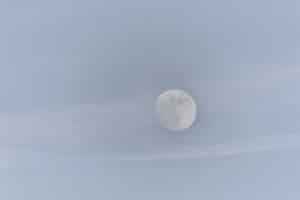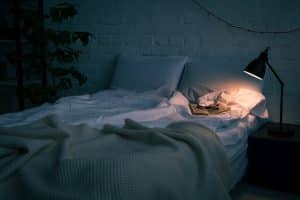
Does the Moon Affect How You Sleep?
We’ve got a fascination with space travel and the mystery of our lunar neighbor. Maybe that explains our curiosity in space missions from Richard Branson and Amazon’s Jeff Bezos. Or how about Elon Musk’s SpaceX mission plans to put a Dogecoin on the moon in 2022? We may have some grasp on the moon’s influence on our lives – menstrual cycles, or the changing ocean tides, for example. But what do we understand about the lunar cycle and our bedtimes? When it comes to sleep, the moon might have us under its spell more than we realize.

The lunar cycle
Before we dive into how the moon’s magic plays with your sleep, here’s a few moon facts you may not know:
- A complete lunar cycle – the length between two new moons or two full moons – is 29.5 days
- Just like earth, as the moon rotates, so do the positions of its day and night sides
- During a full moon, the sun shines and illuminates it’s day side. A full moon rises around sunset and sets around sunrise
- The new moon is different. This is considered the ‘invisible phase’ when the moon is up during the day. It’s when the moon’s night side faces the earth, and the illuminated side faces the sun
Moon science and sleep
In a recent study, scientists at the University of Washington tried to reveal the secrets of the moon and sleep. The researchers looked at 3 different Indigenous communities in Argentina. Their hope was to understand how the moon impacted sleep patterns. The participants had varying levels of access to electricity. Some lived in full urban settings while others had no electricity at all. They used special wrist devices to track sleep patterns across different phases of the moon. The results were striking.
The scientists noticed that sleep-wake cycles were synchronized with the lunar phases. Most noticeable were changes in how much sleep participants got and the time of bedtime. In some cases, sleep duration changed by as much as 1.5 hours! Bedtimes varied by as much as 80 minutes.
They found another interesting pattern. 3-5 days before a full moon, people tended to stay up later and sleep less. The opposite was true just after a new moon. The interesting part? Artificial light didn’t seem to interfere with the findings. The study spanned communities where participants had varying levels of access to electricity. Which means that moonlight could not fully explain the findings. Everywhere, people’s sleep patterns were affected by moon phases – pretty cool, right?
What this means for you
Now that you know a full moon can disrupt your sleep – you can be proactive! Ensure you take steps to get a good night’s sleep. Avoid caffeine late in the day, try to keep a consistent sleep schedule, and practice relaxation exercises before hitting the hay.
And next time you find yourself moonstruck, remember that our distant neighbour may be tinkering with your shut eye every month!







